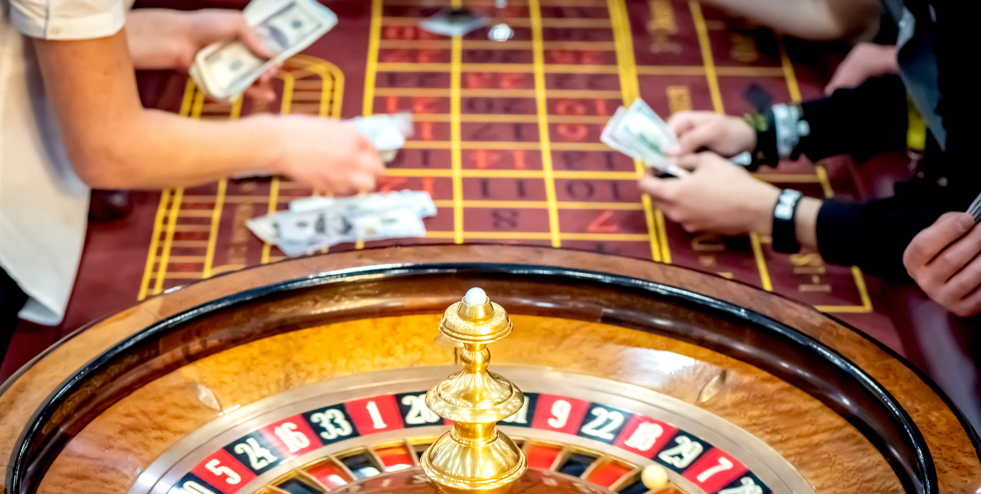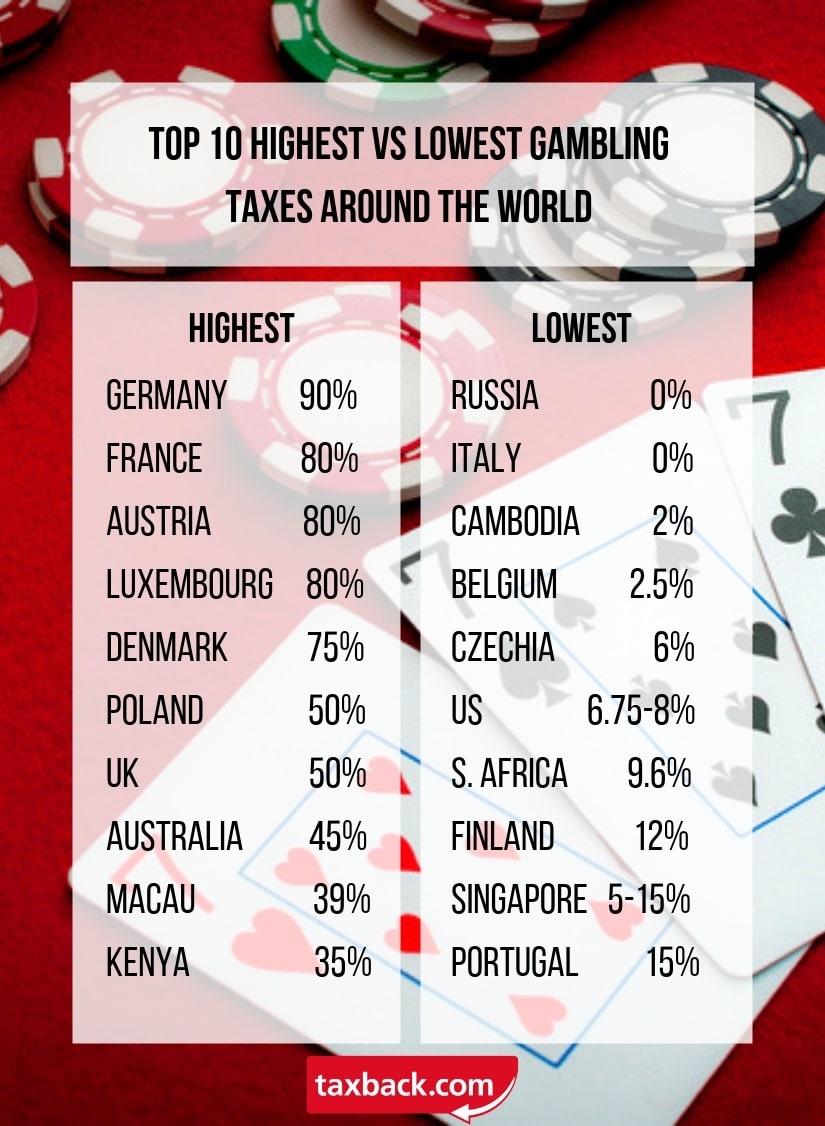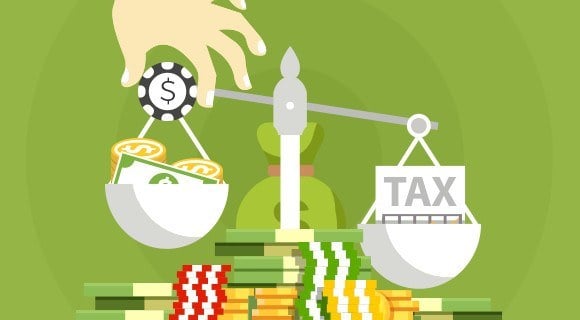Based on your answers to several questions, the e-File app will select and prepare the tax forms necessary to report your gambling winnings and losses on your tax return. However, if you want to learn more about how your gambling income affects your taxes, read on. Your Tax Year 2020 Return is due April 15, 2021. Tax Obligations Outside Of The USA The United States is a bit of an outlier when it comes to taxing gambling winnings. In the United Kingdom, the government taxes the gross profits of casino operators rather than players. Canadians can play the lottery, live casinos, poker and online games without paying taxes unless they are a professional. For instance, Canadians who win over $1,200 in an American casino must pay a 30% tax, which is usually withheld at the cashier. The good news is that there is a casino tax refund for Canadians. The bad news is that you need to prove losses or related expenses to qualify for it.

Canadian tax law doesn’t treat income from gambling as taxable income but it doesn’t allow deductions for gambling activities. Statistics Canada reports that in 2010, government-run gambling activities generated $13.7 billion dollars in net revenue. This rendered gambling the. Whether you’re gambling online or at land-based casinos in Canada, you will not be taxed on your winnings. There are many casino resorts throughout the country. You can find some of the best in Edmonton, Vancouver, Richmond, Winnipeg, Halifax, Windsor, Niagra Falls, Toronto, Montreal, and even in Saskatchewan.
Introduction – Taxation of Gambling and Sources of Income
In the Canadian income tax system, only income which can be traced from a 'source' is considered taxable. The accepted sources of income under the Income Tax Act are:
- Office
- Employment
- Business
- Property
- Other sources
While 'other sources' is rather vague, it is commonly accepted that windfalls, gifts, inheritances, strike pay, and lottery winnings, just to mention a few, are not considered sources of income for income tax purposes. Winnings from gambling on the other hand are slightly different in that they are also generally non-taxable, but, if considered to be part of a business, become taxable.

Hobby vs Business
To determine whether gambling is undertaken as a hobby or as a business, the Supreme Court of Canada has laid out a test in Stewart v. Canada. The Stewart test is a two part test: 1) is the taxpayer's activity undertaken in pursuit of profit, or is it a personal endeavour; 2) if it is not a personal endeavour, is the source of the income business or property. Where a taxpayer's venture has elements that suggest it could be considered a hobby or other personal pursuit, then the venture will only be considered a source of income if it is undertaken in a sufficiently commercial manner. For gambling, only the first part of the test is relevant – if part 1 is satisfied, then for part 2 of the test, gambling winnings default to business income as they are almost in all circumstances not going to be income from property.
In terms of whether the subjective intent in undertaking the activity is for the pursuit of profit, for gambling, this subjective intent is essentially always exists to some extent just by the nature of gambling. Since that is the case, a determination needs to be made as to whether the predominant intention is to profit. Finally, the gambling activity needs to be carried out in accordance with objective standards of businesslike behaviour. If those elements are met, then the gambling activity will be considered a business activity and any wins or losses will be taxed accordingly. Call our top Toronto tax firm and learn more about how to differentiate between a hobby and a business.
Standards of Businesslike Behaviour
It is important not to equate a successful venture with businesslike behaviour. While running a venture is likely to increase the chance of success, mere evidence of profit doesn't make a venture a business. It is inappropriate to simply look backwards and conclude a profitable venture must be a business and an unprofitable venture must not have been run with sufficiently businesslike behaviour. This was made clear in Leblanc v. The Queen where two brothers purchased sports lottery tickets on a massive scale. They made approximately $50 million in bets and earned a profit of approximately $5 million. Additionally, they would try to make deals with ticket vendors to get discounts on bulk purchases and hired helpers to visit different vendor locations and purchase tickets. However, the Court in analysing their conduct determined that the objective standards of businesslike behaviour were not met. Amongst other things, the judge found that the Leblanc brothers had no system involved in their gambling that would mitigate risk and or increase their chances of winning. The judge found that they bet massively and recklessly and were successful simply due to good luck.
On the other hand, a key case where gambling winnings were found to be business income was in the case of Luprypa v. The Queen. Luprypa involved a skilled pool player who made approximately $1,000 a week playing staked pool games against bar patrons. However, what differentiates Luprypa is that he carefully managed the risks, focused on an area where he was particularly skilled, and involved a system to maximize his chances of winning. Specifically, he would only play staked games after 11pm and would target inebriated bar patrons while remaining entirely sober. Furthermore, in the afternoons, he would consistently practice playing pool to perfect his skills.
Taxability of Poker Winnings

Poker differs from many other gambling activities in that is considered that skilled players can significantly increase their chances of winning and can make a consistent profit playing. Cohen v. The Queen is a key case specifically addressing poker where a lawyer quit his job and became a professional poker player. He initially read books and articles on poker strategy and how to use math to increase his chances of winning and testified that he had a strategy where he would focus on playing against inexperienced players and win a high volume of small stakes games. The judge in Cohen listed out 5 factors that he considered in making a determination of whether there was evidence of a poker business:
- Profit and loss experience in past years;
- Taxpayer's training;
- Taxpayer's intended course of action;
- The capability of the venture to show a profit;
- Other factors from Luprypa
In this case, the taxpayer just started his professional poker career and had no past history so factor 1 was inapplicable. On factor 2, the judge found that, while the taxpayer did have some evidence of researching poker strategy and that he attended a poker seminar, he did not have any special training nor was his knowledge or skill in poker unusual or beyond that of a normal poker player. The judge also noted that as an example of his point, many hobby chess players own enough game strategy books to fill a small library, but that in itself does not make one a professional chess player and similarly, possessing that type of material does not make one a professional poker player. Factor 3 was an analysis of the taxpayer's business plan and overall strategy and the judge found that there was no overall business plan and that his strategy of minimizing risk by playing low stakes games was quickly abandoned by the taxpayer as he began to play high stake games with more experienced players. On factor 4, the judge similarly found that there was no evidence that substantiated the taxpayer had a business plan, with no budget, proper records of the number of games he played or how much he won in any particular game, and was inconsistent with a venture that had the capacity for profit. Finally, factor 5 considered the factors in Luprypa, many of which overlap with the first 4 factors, but essentially the judge was not convinced that the taxpayer showed any particular skill, did not see any evidence of a system which would increase his chances of winning and minimize risk. As such, the judge concluded in Cohen that the poker activities were not conducted in a sufficiently businesslike manner and thus denied the losses that the taxpayer claimed.
Tax Tip – Take Care When Claiming Gambling Losses
The take home on this subject is that gambling is rarely considered a business venture unless a coherent 'system' is being used to minimize risk and maximize the chance of winning. Furthermore, this 'system' needs to be more than what a reasonably enthusiastic hobbyist would do. What this means is that Cana dians who are casually gambling should not be particularly worried that their gambling winnings will be taxed. The flip side of this is that losses from gambling are also difficult to claim as the standard for businesslike behaviour in a gambling context is extremely high. If you think you have significant profits or losses from gambling and think you might meet the requirements for businesslike behaviour, speak to one of our experienced Toronto tax lawyers and make sure you won't be surprised by a big tax bill or miss out on claiming a valid business loss.
The content of this article is intended to provide a general guide to the subject matter. Specialist advice should be sought about your specific circumstances.
CRA Tax Audit Of Loss Carryovers Exceeding $200,000 Graduated Rate Estates (GRE): Toronto Tax Lawyer Guide
Graduated Rate Estates (GRE): Toronto Tax Lawyer GuideCanada Casino Winnings Tax Free
ELIG Gürkaynak Attorneys-at-Law
Poul Schmith
Meyerlustenberger Lachenal Ltd.
Casino Tax Recovery Canada
Meyerlustenberger Lachenal Ltd.
Casino Tax Refund Canada
Meyerlustenberger Lachenal Ltd.